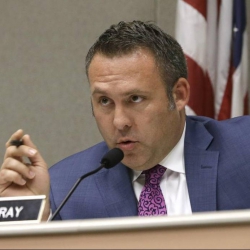
John Pappas of the PPA suggested Adam Gray (above) tried to strong-arm Morongo with a last minute compromise.
The chances of a California online poker bill passing in 2016 are gone. The verdict went the state’s legislative session for 2016 ended on Wednesday, August 31.
The various lawmakers head back to their home districts the next two months to campaign for a new term in office. Those who do not face a vote go to campaign on behalf of others. Meanwhile, gaming interests who spiked the deal can breathe a sigh of relief.
Tribes Could Not Agree on Gaming Law
The bill’s 2016 defeat can be traced to the same prevailing forces which defeated online poker legislation in 2014 and 2015. For the third straight year, California’s tribal gaming interests could not reach a compromise deal.
For the past several years, two coalitions of Native American tribes have been deadlocked over their dueling visions of California online poker. On the one side, the Pechanga and Agua Caliente lead a coalition of tribes who want to see PokerStars banned from California as a “bad actor”. PokerStars continued operating in California (and the United States) after the federal UIGEA law went into effect on December 31, 2006.
10-Year PokerStar Ban
Because it defied California and US federal laws, the Pechanga and Agua Caliente want a steep 10-year ban against PokerStars and Amaya Gaming, it parent company.
On the other side is the Morongo and San Manuel tribes. The two tribes have signed a partnership deal with PokerStars, on the chances that California passed an iPoker law. The deal also includes 3 private cardrooms in Los Angeles: the Bicycle Room, Commerce Club, and Hawaiian Gardens.
Morongo Preferred a 5-Year Soft Ban
The Morongo coalition grudingly accepted a 5-year soft ban on PokerStars. The ban could be lifted if PokerStars paid a $20 million fine to the state. Since PokerStars owns 70% of the global online poker market and once paid a $700 million-plus fine to the United States government without missing a beat, such a fine would be surmountable.
In New Jersey, PokerStars immediately began to dominate the competition, in the first week its partnership site with Resorts Casino launched. It dominated, despite other operators having a 2 and 1/2 year head start on building a customer base.
The Pechanga and Agua Caliente know PokerStars would dominate any market it entered, so the only way to compete is to defeat them in the legislature. In their defence, Pechanga and Agua Caliente have no reason to support a bill which includes PokerStars, because most of the potential revenue would go to a competitor.
Pechanga and Agua Caliente Tribes
Thus, when Assemblyman Adam Gray’s online poker bill hit the California General Assembly’s floor on August 17, it faced serious opposition. Adam Gray tried to save the deal by getting rid of the soft ban and imposing a “compromise” hard 5-year ban. Neither side seemed interested.
John Pappas of the Poker Players Alliance indicated in a recent interview that the lawmakers tied to the Morongo and San Miguel tribes opposed Adam Gray’s last compromise.
Pappas said, “To suggest that the amendments are the result of some sort of compromise I don’t think is accurate. It was not the result of various stakeholders coming to the table with Assemblyman Gray, hashing out their differences and saying this is what I’m willing to give and this is what I’m willing to take.”
The Standoff Lasts Into 2017
Morongo, San Miguel, and PokerStars are willing to wait another year for a better potential deal. For thir part, Pechanga and Agua Caliente are willing to stall for another year. PokerStars has other serious legal issues which might keep it from competing in the United States, so it is better to let that legal drama play out for another few months.
Amaya Gaming’s CEO stepped down in August, after being charged with insider trading by Canadian regulators. The CEO, David Baazov, had nothing to do with PokerStars’ bad actor years. But Amaya Gaming is going through a rough period of transition where it is likely to be dealing with continued probes by Canadian officials, as well as the fallout of any new revelations from the AMF’s investigations.
Also, Amaya’s and PokerStars’ current troubles are likely to cause an image problem. Already, the anti-PokerStars forces in California have pointed to the alleged insider trading as a reason that the corporate culture at PokerStars remains bad. David Baazov’s legal issues might be one more reason Amaya and its allies are willing to wait until 2017, when the new leadership has a chance to gain a firmer footing and build relationships with lawmakers, tribal leaders, and industry executives.
